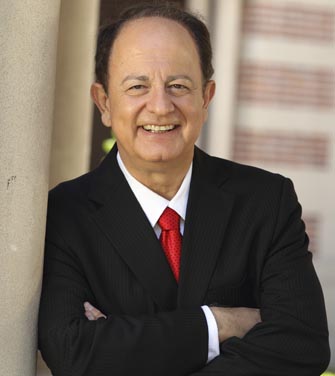
Speaking to faculty on the Health Sciences Campus in his first major speech about the academic future of the university, USC President C. L. Max Nikias answered the question of why he chose this campus.
“Because we will be placing a spotlight on this campus,” Nikias said. “This is your moment to shine–to shine on the Los Angeles stage, and the national stage, and the international stage, as the Pacific Rim grows in power and influence. Why this campus? Because the ancient and noble profession involving medicine and human health is getting ready to dominate this century.”
The address, held in the Mayer Auditorium on Wednesday, Aug. 25, acknowledged the university’s history as a “global research powerhouse,” with a strong commitment to “conquering new intellectual frontiers.” Nikias noted his belief that as the 21st century would be the age of medicine and biology, medical schools and the biological and health sciences would become more central to life at leading universities.
“All the leading universities will be known for their medical and health sciences schools that perform translational research and deliver world-class patient care by increasingly translating new ideas from the laboratory to the clinic,” said Nikias.
Stating the desire to build on USC’s position as a leading research university, Nikias described his priority to strengthen the Keck School of Medicine and position it among the very best medical schools in the country.
Key to that strengthening is the development of a vibrant academic medical center. The April 2009 acquisition of USC University Hospital and USC Norris Cancer Hospital, and the recent integration of all physician practices into the university, has provided the university with fiduciary control of all of its medical enterprise operations and an increased level of autonomy.
“We are playing to win here,” he stated. “Let’s make no mistake about it. When it comes to doing good for the world, we believe there is a USC way to do it, and we compete for the right to do it the USC way. This way is entrepreneurial, engaging, forward thinking, ethical, adaptable and resilient. We aspire to put this approach to work as we build the very best academic medical center in Southern California.”
Nikias outlined several initiatives designed to increase patient revenue and prestige, both as a university and an academic medical center with a top-tier medical school. He announced a campus beautification project on tap for this year, which will provide a welcoming place for patients, faculty, students and staff.
Referencing the legendary ability of the face of Helen of Troy to launch 1,000 ships, Nikias joked, “If the new face of our City of Troy could bring a few thousand new patients, we are all going to be very happy.”
Attracting new interdisciplinary faculty who can serve as bridges between the campuses was also stated as a key priority by Nikias. He acknowledged the recent $58.6 million Clinical and Translational Science Award presented to USC by the National Institutes of Health as an example of the stellar work that can be achieved when schools work together. The award-winning team is comprised of faculty from eight different schools at USC.
“It is when our faculty, professors and students join with others and learn to challenge our views that discovery and invention can reach new levels on our campuses,” he said.
Key to all of these goals is an effort to increase revenue substantially. Nikias told faculty to expect the announcement later this year of the largest fundraising campaign in university history.
While the effort ahead may seem daunting, Nikias affirmed that he believes the university’s position is strong, with plenty of untapped potential.
“At the very moment when the center of gravity of our world is shifting from the Atlantic to the Pacific, we will be able to extend USC’s influence where it lies most,” he said. “Given USC’s location, our international heritage and our academic strengths, this university can hope to embody the intersection of the Pacific century and the biological century.”
